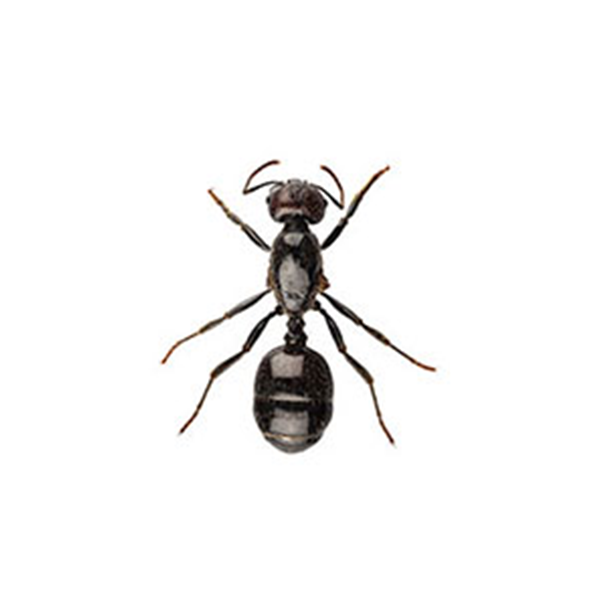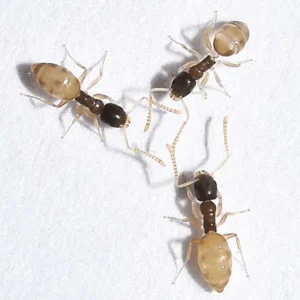Little Black Ant Identification
The little black ant is a common structural pest and a very common ant species in North Carolina. Little black ants are highly adaptable and are not usually associated with indoor colonies. Typically nesting outdoors, little black ants access homes or structures in search of food. They are omnivores, feeding on both plant and animal foods. Little black ants feed on a variety of foods including sweets, meats, grease, insects, and even feed on bird feces. Relentless pests, little black ants can be difficult to eliminate.
What Do Little Black Ants Look Like?
Little black ants, true to their name, are small in size, typically measuring about 1.5 mm in length. They are dark brown to black in color, with a shiny appearance. These ants are characterized by their small size and uniform coloration, which can help distinguish them from other ant species.
Signs of a Little Black Ant Infestation
Signs of a little black ant infestation include visible trails of these tiny ants, particularly in kitchens and bathrooms. They are often attracted to food sources in homes, so seeing them around crumbs, spills, or other food residues is a common indicator. The sight of little black ants inside homes may signal a larger infestation outdoors or within the structure.
How to Get Rid of Little Black Ants
To get rid of little black ants, start by using targeted bait strategies that effectively disrupt their colonies. This involves positioning ant bait along their trails to ensure they carry the bait back to their nests. Monitoring ant activity is essential to assess the effectiveness of your approach.
If infestation continues, a professional ant removal service helps ensure a thorough resolution to the problem. Contact Bug Out to help safeguard your property from ants today.
Habitat, Diet, Life Cycle & Bites
Where Do Little Black Ants Live?
The colonies of little black ants may contain several queens and be heavily populated. Generally, little black ant infestations start outside and can be traced back to mulch, stones, a stump, tree, log, fence, or pile of lumber or bricks. Indoors, little black ant colonies will nest in wall voids and cabinets, as well as, within and behind foundations and brick or stone veneer. When colony populations are at their peak, little black ants may spread throughout a structure quickly, invading every gap and crack or crevice.
Diet of Little Black Ants
Their diet consists of a wide variety of foods but they are primarily attracted to sweet substances. They also feed on other insects, plant secretions, and food debris found in homes.
Life Cycle of Little Black Ants
The life cycle of little black ants follows the typical pattern of egg, larva, pupa, and adult. Queens lay eggs that hatch into larvae, which are then fed and cared for by worker ants until they develop into pupae and eventually mature into adults.
Little Black Ant Bites
Little black ants can bite, but their bites are not harmful and generally cause no more than minor discomfort.
Are Little Black Ants Dangerous?
Little black ants are not considered dangerous, they do not pose a health threat, nor are they known to cause significant damage to structures. Despite the fact that little black ants have a small stinger that doesn’t really do any damage, they can become a considerable pest when they invade a home in large numbers. These tiny invasive bullies are aggressive and have been known to wipe out entire red imported fire ant colonies. While they favor nesting outdoors, their small size allows them to gain access under window sills, beneath carpets and floorboards, and any crevice inside your home. Unlike larger yellow ants, little black ants can become a persistent issue if not addressed promptly. If a little black ant infestation is suspected, it is recommended to consult a licensed ant exterminator.
Little Black Ant Prevention Tips
Prevent little black ants by maintaining a clean household, sealing cracks and crevices in your home’s exterior, and removing standing water and food residue. Regular pest inspections can also help catch infestations early.
Need help with Little Black Ants control?
FAQs
Why Do I Suddenly Have Tiny Ants?
A sudden appearance of tiny ants in your home is usually due to them being attracted to food sources or moisture. Changes in weather can also drive them indoors.
Can Little Black Ants Damage Your Home?
Little black ants do not typically cause structural damage to homes. However, they can be a nuisance and contaminate food sources.





